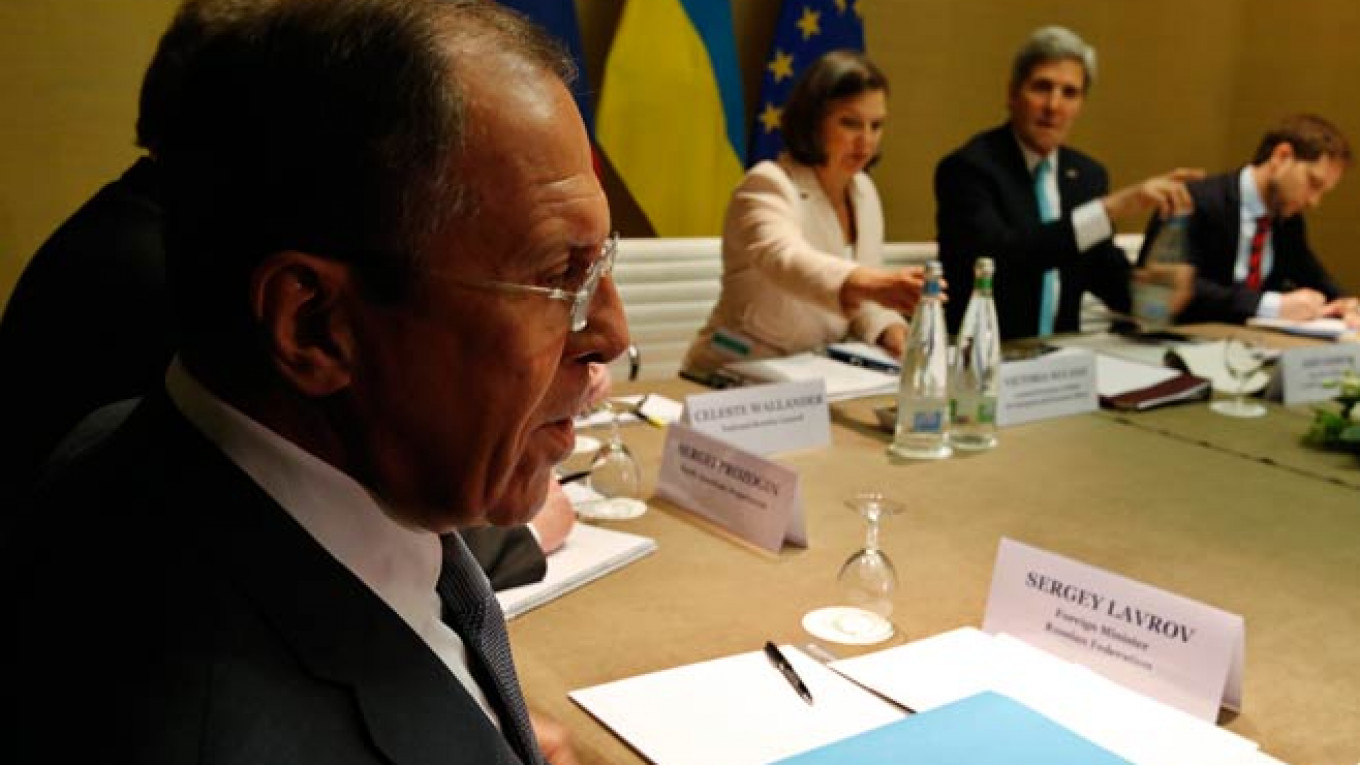After seven hours of talks in Geneva on Thursday, Russia, the U.S., the European Union and Ukraine reached a deal on a joint plan to ease tensions in Ukraine.
"We agreed that all the parties must refrain from any violence, any intimidation or provocative activity," Foreign Minister Sergei Lavrov said at a news conference following the negotiations.
The parties agreed that illegally armed groups must be disarmed, all buildings seized by Russian-leaning separatists must be returned to the legitimate owners, and protesting crowds should leave occupied public venues in all Ukrainian cities.
The statement adopted after the talks also urged the current government in Kiev, which took power after massive public protests led to a regime change in the post-Soviet country, to start a dialogue with the country's regions on constitutional reform.
U.S. Secretary of State John Kerry, who had two face-to-face meetings with Lavrov on Thursday, said that the agreement represented "a good day of work" but that the West expected "the words on paper to be translated in actions immediately."
The Geneva talks were held despite Russia's threats to ignore them, with the EU, U.S. and Ukraine aiming to get guarantees from Russia to stop an escalation of the conflict in eastern Ukraine. Russia does not recognize the rulers in Kiev as legitimate, as Ukraine's eastern provinces have turned into an area of violent confrontation between Russian-leaning militants demanding the federalization of Ukraine and the central government standing for a unified nation.
Lavrov told journalists Thursday that Russian diplomats had given their European and peers documents laying out the views and ideas of opposition groups from eastern Ukraine.
The situation turned violent last week in a number of cities in the east of the country after insurgents, who the West says are backed by Russian troops, seized government buildings. Kiev announced a military operation against them earlier this week.
During an annual call-in show, President Vladimir Putin said the Geneva talks were important but emphasized that a solution to the crisis could be reached only through dialogue between Kiev authorities and the people of eastern Ukraine, not through talks between Russia and the U.S.
"We believe that it should not just be a showcase dialogue and we have to think all together about how to regulate the situation," Putin said, expressing confidence that Russia and Ukraine would find a mutually acceptable solution.
But he rebuked Kiev for launching a military operation in eastern Ukraine.
On the eve of the talks, the U.S. State Department said the U.S. was considering requests from Kiev for support of its Army in the form of arms or ammunition, news agencies reported. On Thursday, the U.S. Defense Department said it had agreed to provide a package of nonlethal aid to the country's Armed Forces.
Quoting a senior State Department official, the Associated Press reported Wednesday that Ukrainian representative Andriy Deshchytsya was going to attempt to persuade Russia that Kiev was taking steps to transfer more power from the central government to the regions by letting regional authorities make budget decisions independently and allowing people to elect their own leaders. The Ukraine delegation were also prepared to discuss Russia's concerns over the rights of the Russian-speaking population in Ukraine.
"I think that we still have a chance to de-escalate the situation using? diplomatic means," he said.
"And we will try hard. We are trying hard — not only Ukraine — but also the U.S. However, the time is now, not only to express the concerns, but to look for a more concrete and adequate response to Russia's plans and actions," Deshchytsya said ahead of the talks.
Putin once again denied Russia's involvement in the violence in eastern Ukraine or in funding militants there and said heavily armed men wearing green uniforms with no insignia were local residents.
"This is nonsense. These are all local residents. These are people who live there," he said.
The U.S. and the EU have imposed visa bans and asset freezes on a number of Russian individuals, with Putin openly mocking these measures. U.S. President Barack Obama also warned Russia earlier this week that new sanctions could be imposed in response to the Kremlin's new steps to destabilize the situation in Ukraine.
Putin said that Europe, which relies heavily on Russian gas, would not be able to end its reliance on Russia's energy resources and added that Ukraine had only one month remaining to pay off its debt for gas supplies.
Contact the author at e.kravtsova@imedia.ru
A Message from The Moscow Times:
Dear readers,
We are facing unprecedented challenges. Russia's Prosecutor General's Office has designated The Moscow Times as an "undesirable" organization, criminalizing our work and putting our staff at risk of prosecution. This follows our earlier unjust labeling as a "foreign agent."
These actions are direct attempts to silence independent journalism in Russia. The authorities claim our work "discredits the decisions of the Russian leadership." We see things differently: we strive to provide accurate, unbiased reporting on Russia.
We, the journalists of The Moscow Times, refuse to be silenced. But to continue our work, we need your help.
Your support, no matter how small, makes a world of difference. If you can, please support us monthly starting from just $2. It's quick to set up, and every contribution makes a significant impact.
By supporting The Moscow Times, you're defending open, independent journalism in the face of repression. Thank you for standing with us.
Remind me later.


